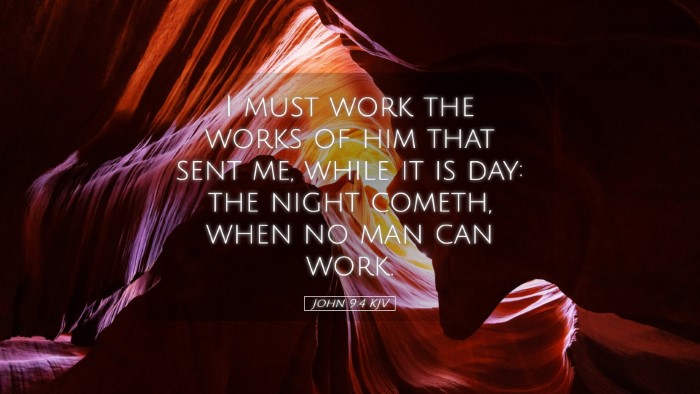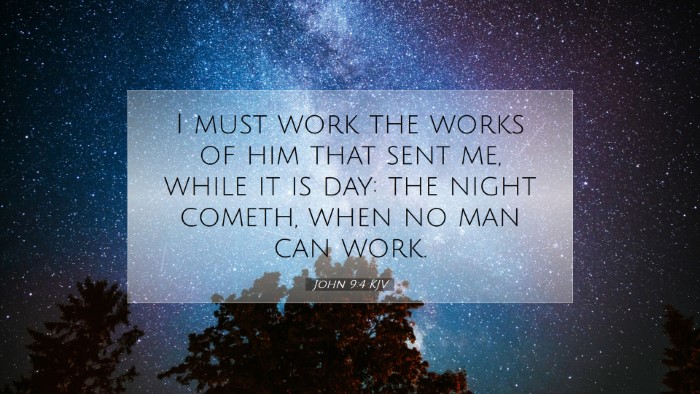Introduction
This verse is a profound statement made by Jesus, reflecting the urgency and purpose of His earthly ministry. It emphasizes the necessity of action during the limited time available to us in this life before the coming of spiritual night—a metaphor for death and the final judgment. The insights from public domain commentaries from Matthew Henry, Albert Barnes, and Adam Clarke provide a rich theological context and practical application for pastors, students, theologians, and Bible scholars.
Contextual Background
This verse sits within a broader narrative where Jesus is about to heal a man born blind. Understanding this context is essential for grasping the implications of His declaration regarding the "works" He must accomplish. The urgency conveyed in this verse reflects not only the nature of His mission but also a paradigm applicable to all believers regarding our responsibilities in the service of the Lord.
Insights from Commentaries
Matthew Henry
Henry emphasizes the decisive nature of Jesus’ mission. He notes that Jesus acknowledges the urgency of performing the Father’s works, suggesting that His time is limited both by the spiritual realities He faces and the impending crucifixion. He writes:
"The works of Christ are the designs and duties he complied with, particularly the great work of redemption."
This framing underscores the notion that while He is physically present, the time to do good is paramount. Henry urges that this should inspire believers to engage in their own works while they have the opportunity.
Albert Barnes
Barnes comments on the meaning of "day" and "night" in this passage, elucidating how "day" represents the period of opportunity and ministry. He reflects on the nature of life as a time for action, stating:
"The night coming, and the cessation of work, is a solemn representation of death and the end of probationary time."
Thus, Barnes challenges readers to realize the importance of seizing their opportunities for good works. He encourages a sense of urgency to minister and share the Gospel in light of the coming night.
Adam Clarke
Clarke provides a detailed analysis of the phrase "I must work." He points out that Jesus implies a divine necessity compelling Him to fulfill His mission. This necessity illustrates the greater divine plan at work, where human cooperation is required for the completion of God's purposes. Clarke elaborates:
"The necessity laid upon Christ is the same that lies upon all His followers; we are all called to the work of our day."
This interpretation extends the application of the verse to identify the shared mission of all Christians, aligning with the Great Commission. Clarke's insights help to inspire a commitment to bear fruit while the light of Christ shines in our lives.
Conclusion
John 9:4 stands as a clarion call to all believers. The combined insights of the noted commentators bring depth to this verse and challenge each generation to recognize the limitations of time in spiritual service. In light of Christ’s urgency, one is encouraged to respond with a fervent commitment to the works of God, with the understanding that the Kingdom's work must not be delayed. As the day is still upon us, may we labor diligently, for the night indeed comes when no man can work.


